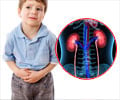Chronic renal failure seems to be on the rise in the southern Indian state of Tamil Nadu and hence experts suggest that children be weaned away from junk food and fizzy drinks. At this rate the renal caseload could soon become unmanageable, they warn.
Besides congenital anomalies, the commonly seen condition in youngsters is tubulo-interstitial nephritis, a kidney disease caused by damage to the tubules of the kidneys and the surrounding interstitial tissue.Among the risk factors for chronic renal failure, now referred to as “Chronic Kidney Disease”(CKD), are sedentary lifestyle, a high calorie diet, uncontrolled hypertension and injudicious use of drugs such as nephrotoxic medicines, antibiotics or risky drug combinations.
While there is no precise data on the incidence of renal diseases in children, paediatric nephrologists assume that kidney-related problems constitute roughly 5 per cent of all diseases among children, reports The Hindu.
And, an estimated 10 per cent of these disorders could be congenital anomalies which, if untreated by an expert, could lead to serious kidney problems in adulthood. However, experts reckon that the magnitude will be higher than this conservative estimate as a result of wrong diagnosis and under-reporting.
The incidence of obesity among school students in Chennai is rising, going by a recent study by M. V. Hospital for Diabetes.“The findings indicate obesity incidence of 18 per cent in the higher socio-economic strata and about 7.5 per cent in the lower socio-economic segment,” said Vijay Viswanathan, diabetologist and managing director of the hospital.
Doctors say youngsters these days indulge in a lifestyle that put them at considerable health risk - fast foods, aerated drinks, lack of exercise and long hours before a computer or the television, to cite a few of the problem areas.
Advertisement
Support organisations such as the Tanker Foundation struggle to cope with the shooting demand for subsidised dialysis services. “The demand for care far outstrips what we can provide even after tightened criteria that limit assistance to the underprivileged,” said Stella Matthew, project coordinator of the foundation, which gets at least five referrals every month from nephrologists in the city.
Advertisement
“Preventive nephrology is the best long-term option for a resource-strapped setting like ours,” said N. Prahlad of Chennai Pediatric Kidney Foundation. An ultrasound scan once in the first five years of a child’s growth can also detect renal problems at an early stage.
Meanwhile, the nephrology treatment gap is getting bigger owing to the dearth of specialists in paediatric nephrology. “This is where training general practitioners in picking up the important clues during clinical assessment becomes important,” said B. R. Nammalwar, president of Pediatric Kidney Foundation.
In the absence of training, the chances of the disease being detected at an early stage at a non-specialist clinic are fairly remote owing to the silent (asymptomatic) nature of the disorder.
The common tips for GPs include judicious use of antibiotics and non-steroidal anti-inflammatory drugs, avoiding risky combination of drugs or administering a nephro-toxic medicine for a dehydrated patient. Sometimes, chronic constipation or bed-wetting could be the first indicators of a renal problem.
Source-Medindia
SRM/L











